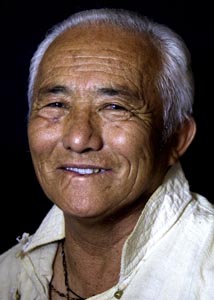Name: Tashi Samphel
(Alias: No)
Gender: Male
Interview Age: 73
Date of Birth: 1939
Birthplace: Ngari, Utsang, Tibet
Year Left Tibet: 1960
Profession: Farming, Herding
Monk/Nun: No
Political Prisoner: No

Interview No.: 39D
Date: 2012-05-20
Language: Tibetan
Location: Mcleod Ganj, Dharamsala, Himachal Pradesh, India
Categories: Culture and History
Keywords: childhood memories, Chinese -- first appearance of, environment/wildlife, herding, nomadic life, refugee in India -- life as, salt trade, taxes, thamzing/struggle sessions, trade, Utsang
Summary:
Tashi Samphel was born in Ngari, which is very close to Xinjiang, China. There were eight members in his family of samadok 'farmers and herders.' He spent his early days playing games, swimming and helping to graze sheep and yaks. Besides working as a farmer, his father was also a salt trader and a tailor. His father bartered the salt for grains in Ladakh, India. Tashi Samphel describes the process of collecting salt from a large water body and transporting it on sheep. He talks about the various types of taxes like salt tax, labor tax and farmers' tax which the common people paid to the government, monasteries and landowners. Once each year all the sheep owned by the monasteries were brought together by the herders for shearing and the wool was collected and purchased by Indians.
Tashi Samphel talks about the first appearance of Chinese, who everyone in his isolated village believed were good people and very helpful. However, gradually the Chinese began to create friction within the Tibetan community and then arrested the prominent people. All the villagers were called to meetings and thamzing 'struggle sessions' were initiated where the poor accused the leaders of oppressing them. Tashi Samphel tells that many of the people of Ngari decided to escape together and travelled to Ladakh with their goats and sheep. He gives a touching description of seeing His Holiness the Dalai Lama for the first time in Dharamsala, whom he had believed was a deity and not a person in flesh and blood.
Interview Team:
- Martin Newman (Interviewer)
- Tenzin Yangchen (Interpreter)
- Pema Tashi (Videographer)

